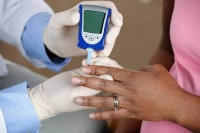Jessica Daniels
blackdoctor.org
(Black PR Wire) If you’re a young adult with prediabetes, you may already know you have a greater than average risk of full-blown diabetes. But you could also be at increased risk for a heart attack, new research shows.
“After taking into account various influencing and modifying factors, we found that young adults with prediabetes had 1.7 times higher chances of being hospitalized for a heart attack compared to their peers without prediabetes,” says Dr. Akhil Jain, co-author of a new study. He’s a resident physician at Mercy Catholic Medical Center in Darby, Pa.
What is prediabetes?
People with prediabetes have higher-than-normal blood sugar levels, and prediabetes can often lead to type 2 diabetes.
More than one-third of Americans 18 or older (88 million) have prediabetes, according to the U.S. National Institutes of Health. Nearly 29 million of them are under 45 years old. Blacks are at a higher risk of developing prediabetes than non-Hispanic whites, especially if type 2 diabetes runs in their family. Approximately 36 percent of Blacks have prediabetes, according to The Wellness Coalition.
In this study, the researchers analyzed nationwide data on more than 7.8 million heart attack-related hospitalizations among adults ages 18-44 in 2018. About 0.4% of the patients had blood sugar levels indicating prediabetes. Heart attack rates were 2.15% among those with prediabetes, compared to 0.3% among those with normal blood sugar levels.
Young adults with prediabetes were more likely than those without prediabetes to have high cholesterol (about 68% vs. around 47%, respectively) and obesity (about 49% vs. almost 26%, respectively). Compared to those without prediabetes, those with prediabetes were most likely to be Black, Hispanic or Asian/Pacific Islander males. They also were more likely to have higher household incomes, and to be hospitalized in urban teaching hospitals or to be hospitalized in the Midwest and West.
“Despite having higher chances of having a heart attack, the young adults with prediabetes did not have higher incidences of other major adverse cardiovascular events, such as cardiac arrest or stroke,” Jain said in a meeting news release.There’s a lack of in-depth research on heart attacks in young adults with prediabetes and more needs to be done, Jain added. “Our study should be considered as a foundation for future research to clearly establish heart disease burden in young adults with prediabetes, given the prevalence of prediabetes of nearly one-third of adults in the U.S.,” he said.
Staying healthy and avoiding prediabetes
Young adults need to be aware of the importance of routine health checkups, including screening for prediabetes, and they should take steps to prevent or delay the development of type 2 diabetes and associated cardiovascular events such as a heart attack, Jain notes.
It is also important to know your risks of developing prediabetes. If you have a parent, brother, or sister with type 2 diabetes, are 45 years old or older, overweight, physically active fewer than 3 times per week, or had gestational diabetes (diabetes during pregnancy), or gave birth to a baby that weighed more than 9 pounds, you have an increased risk of developing prediabetes.
By knowing your family history and getting screened, you find out if you have prediabetes as soon as possible, which will allow you to reverse it and prevent it from progressing into type 2 diabetes. According to studies, people who participate in the Centers for Disease Control and Prevention’s (CDC’s) National Diabetes Prevention Program lifestyle change program can reduce their risk for type 2 diabetes by 50%.
Prediabetes can be reversed through these lifestyle changes: eating a healthy diet, becoming physically active, losing weight, quitting smoking and reducing stress, according to the AHA.
The research was presented at the American Heart Association’s Quality of Care and Outcomes Research Scientific Sessions, held Friday and Saturday in Reston, Va. Data and conclusions presented at meetings should be considered preliminary until published in a peer-reviewed medical journal.

